[Dec 2007, Volume 4 Quarterly Issue] Pdf File size - The IIPM Think ...
[Dec 2007, Volume 4 Quarterly Issue] Pdf File size - The IIPM Think ...
[Dec 2007, Volume 4 Quarterly Issue] Pdf File size - The IIPM Think ...
Create successful ePaper yourself
Turn your PDF publications into a flip-book with our unique Google optimized e-Paper software.
Anurag Sharma<br />
Research Fellow,<br />
Faculty of Business and Economics,<br />
Monash University, Melbourne<br />
Indian Banking Reforms and Policy<br />
Reversal: A Vicious Cycle<br />
"In sovereignty there are no gradations. <strong>The</strong>re<br />
may be limited royalty, there may be limited<br />
consulship; but there can be no limited government.<br />
<strong>The</strong>re must, in every society, be some<br />
power or other, from which there is no appeal,<br />
which admits no restrictions, which pervades the<br />
whole mass of the community, regulates and<br />
adjusts all subordination, enacts laws or repeals<br />
them, erects or annuls judicatures, extends or<br />
contracts privileges, exempt itself from question<br />
or control, and bounded only by physical<br />
necessity.<br />
By this power, wherever it subsists, all legislation<br />
and jurisdiction is animated and maintained.<br />
From this all legal rights are emanations, which,<br />
whether equitably or not, may be legally recalled.<br />
It is not infallible, for it may do wrong; but it is<br />
irresistible, for it can be resisted only by rebellion,<br />
by an act which makes it questionable, what shall<br />
be thenceforward the supreme power."<br />
-Samuel Johnson<br />
1. Introduction<br />
In the first decade following India’s independence<br />
in 1947, the banking sector<br />
was characterized by low reserve requirements<br />
and no control on interest<br />
rates (Demetriades and Luintel, 1996).<br />
Acting pursuant to its policy of directed<br />
and concessional lending to priority<br />
sectors (agriculture, exports, small<br />
scale industry) the government assumed<br />
control of the financial sector in the<br />
1960’s by nationalizing the major banks.<br />
Liquidity requirements were raised and<br />
interest rates on lending and deposits<br />
controlled and these became a major<br />
source of inefficiencies in the banking<br />
sector, through out the 1970’s and<br />
1980’s. Concessional lending to priority<br />
sectors with weak regulatory and supervision<br />
framework led to a high incidence<br />
of Non Performing Assets (NPA)<br />
in the banking sector. In 1992-93 NPA<br />
amounted to 24 percent of the total assets<br />
of public sector banks. <strong>The</strong> government<br />
began a gradual process of financial<br />
sector reforms in the mid 1980’s.<br />
Even though the pace of reform increased<br />
following the 1991 financial<br />
crisis, they remain incomplete. Demetriades<br />
and Luintel (1996) examine the<br />
effect of various types of banking controls<br />
on financial deepening in India<br />
and conclude these controls (with the<br />
exception of the lending rate ceiling)<br />
are having a negative impact on financial<br />
deepening and thus adversely affecting<br />
economic growth.<br />
<strong>The</strong> Indian economy has experienced<br />
more than a decade of economic reform<br />
following the 1991 financial crisis. <strong>The</strong><br />
present paper focuses on a critical analysis<br />
of the reforms process with emphasis<br />
on the banking sector, to highlight<br />
those inefficiencies which can contribute<br />
to “policy reversal” by the government.<br />
Policy reversal can be described<br />
as a situation in which government policies<br />
of sound fiscal management or<br />
financial restructuring adversely affect<br />
the banking sector (due to underlying<br />
inefficiencies) so that the government<br />
is forced to revive the banking sector by<br />
116 THE <strong>IIPM</strong> THINK TANK


![[Dec 2007, Volume 4 Quarterly Issue] Pdf File size - The IIPM Think ...](https://img.yumpu.com/29766298/115/500x640/dec-2007-volume-4-quarterly-issue-pdf-file-size-the-iipm-think-.jpg)
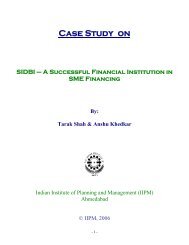
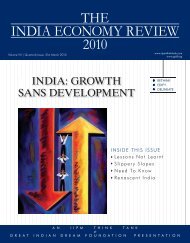
![[Feb 2008, Volume V Annual Issue] Pdf File size - The IIPM Think Tank](https://img.yumpu.com/43961117/1/190x245/feb-2008-volume-v-annual-issue-pdf-file-size-the-iipm-think-tank.jpg?quality=85)
![[June 2008, Volume V Quarterly Issue] Pdf File size - The IIPM Think ...](https://img.yumpu.com/41693247/1/190x245/june-2008-volume-v-quarterly-issue-pdf-file-size-the-iipm-think-.jpg?quality=85)
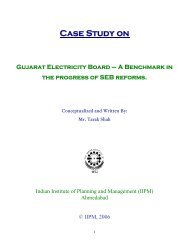
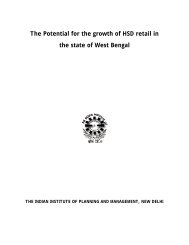
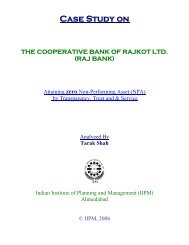
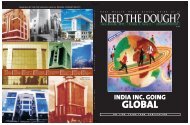

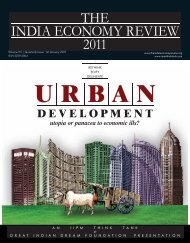
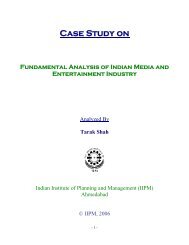
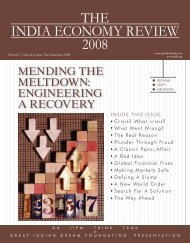
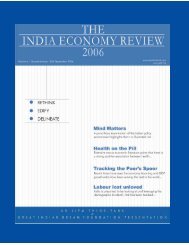
![[Volume VI | Quarterly Issue: 31st May 2009] Pdf File size](https://img.yumpu.com/27796051/1/190x245/volume-vi-quarterly-issue-31st-may-2009-pdf-file-size.jpg?quality=85)